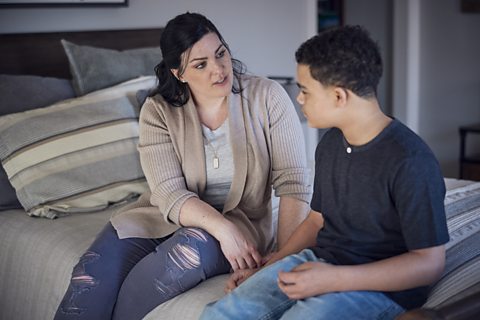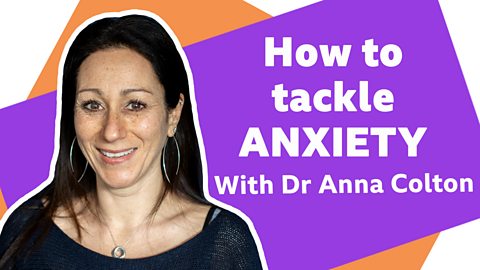Finishing the last of the school exams can feel like a weight has been lifted, not just for the young people sitting them, but for their parents and guardians too. It can also mean the start of a new anxiety - waiting for the results. Summer months that are meant for rest and relaxation can be tainted by worries of how they’ve gone - and it can be difficult to know what you can say to be there to support your child.
Bitesize Parents’ Toolkit has spoken to Educational and Child Psychologist Dr Anisa-Ree Moses from Learning & Wellbeing Psychology who has examples of things you should avoid saying in the days before and after results day.
"Are You Nervous?"

It can feel natural to ask someone if they’re feeling nervous, but Dr Moses says that especially when asked repeatedly, it can make children feel awkward because it’s a closed question.
“We can likely assume that they’d answer, “Of course I’m nervous.” It’s a closed, yes or no question, with no room for further discussion,” explains Dr Moses. Instead of using a closed question, you should aim for an open question which invites them to share how they feel, “How are you doing? How are you feeling in the lead up to getting your results?”
“We’re not expecting anything, so don’t worry about your results”

You might think it’s a good idea to tell your child that you’re not expecting them to do well to make them worry less, but Dr Moses doesn’t think this is a good idea, “They’ve put that effort in and you’re saying that you’re not expecting anything from all those tears and all that toil. It can feel like a lowering of expectations. Assuming there’s a positive intent, then you’re just trying to reduce their worry, but they are probably going to worry regardless”
Dr Moses says that they want you to have high expectations of them but also want you to offer your reassurance. You could say something like, “We’re here for you, no matter what your results are.” She suggests distractions are a good way to take their mind off the worry. Plan nice activities, "Something like a movie night - or even going for a walk."
“As long as you get 'X' you’ll be ok”

According to Dr Moses, “Your child will already be clear about what grades they need and they don’t need a constant reminder of that. It can seem like a throwaway comment, but it can really sting and make them worry more.”
First you want to connect and acknowledge your child’s feelings, she suggests you could say, “It sounds like this whole waiting for results is really stressful, waiting like this can be quite hard”, then it can be useful is to ask your child if they want help to plan for the different eventualities, “What can we do if you don’t get the grades?”, making sure they know there’s a plan of action in place.
But it’s important that you let your child take the lead. Dr Moses says, “You know your child. For some, talking too much about different plans could be overwhelming but for others, going into detail could be useful.”
"Good luck!"

This can feel like a harmless phrase, but Dr Moses explains how at this point, the results have nothing to do with luck, “the exam is done now so there is no luck involved. It can make it feel like the exams are down to chance and that they don’t have any control over the results. They might have worked hard, and this can undermine the effort they put in.”
She suggests that it’s best to avoid anything which brings chance into the mix and instead to let them know that you support them.
“I told you that you should have revised more…”

When it comes to the day itself, there are things Dr Moses thinks it’s best to avoid saying, including taking your own emotions out on your child.
Dr Moses says, “Results day can take over a household. If your child’s results aren’t what you’re expecting, it can be easy to become angry and disappointed and it can be difficult to contain how you feel.”
“An important thing to do on that day as an adult in this situation is to react carefully - your reaction is going to hold a lot of weight. My sister who is in her 40s can still remember the reaction our mum had to her results.”
She suggests there are better ways to approach the situation, “You could say, “this might be disappointing, but we can help you find a way forward.” After some time, it might be helpful to help them reflect and to think about what they can do differently next time to prepare themselves.”
“It’s not the end of the world that you didn’t get the results you were hoping for.”

Dr Moses says, “'This can be a tricky phrase as it can seem reassuring to some but not to others. It could be reassuring for some who are very anxious and need to know that their whole life’s success if not based on a single set of exams.”
But for others it can have the opposite effect, “It can be catastrophising, by mentioning the end of the world it can heighten the emotions of the situation. This phrase often comes from adults' wealth of years and experience of life, and in the grand scheme of things you may well be right. But to that young person, it can feel like a lot rides on the outcomes of their exam results - it can really feel like exams have been their whole world for the last few months.”
She suggests instead you say, "I'm sorry the results weren’t what you were expecting,” and that you acknowledge the results they got and invite the young person to say how they feel.
“Maybe everyone’s done badly this year…”

Dr Moses thinks comparing your child to others is not a good idea, “through social media your kids will know how their friends did, and even what people around the country have got. So they could disprove what you’re saying.”
She thinks it’s important to think carefully about social media use on results day, “If they've done well, maybe they could post something, but posting lots could be overwhelming to other people. It might be a good idea to have a social media ‘cool off’ and support the young person in not getting lost in social media’s portrayal of results day.”
“I’ll phone the school/university to see if you can still get in.”

It can feel natural to want to step in and see if you can fix things for your child, but it’s important to let your child take the lead.Dr Moses says, “If the results aren’t what you expected, it can leave you feeling out of control. As humans, we like to be in control, and can take action straight away as parents.”
She explains that it’s important to not make decisions on your child’s behalf that they might regret as they haven’t had the chance to think through themselves, "If you take the lead before your child is ready to make decisions, it can make them step back and you may miss what they really want to happen".
Instead, “You’re the helper, not the problem solver - your child might have ideas different to yours. Instead of saying what you will do, ask what you can do to help.”
Your child can find resources and answers for themselves, and you can possibly help to signpost information and advice - the 91»»±¨ has explainers that can help understand the process around results day like this 91»»±¨ News article on GCSE and Nationals and BTECs or this study support from Bitesize.
Once results day is over, Dr Moses says, “It’s important to keep an eye on your child in the following days and weeks, especially if the results haven’t been what they wanted or expected. Are they sleeping, eating, socialising differently to normal? If they are, you might need to seek further support from their school or organisations like Young Minds.”


More from 91»»±¨ Bitesize Parents' Toolkit‚Ķ
Parents' Toolkit
Fun activities, real-life stories, wellbeing support and loads of helpful advice - we're here for you and your child.

How to manage Results Day 2024: Six tips for parents
Advice on supporting your child as they prepare for their results and evaluate their options.

How to support your teen as they decide on their future career
Career coach Mark Anderson has advice for parents of teens who are choosing their options at GCSE or are nearing the world of work.

How to tackle anxiety with Dr Anna
Calming techniques to help parents and children manage their anxiety.

Results Day: Parents' fears and expert advice
A child psychologist offers advice to real parents with results day anxieties and expectations.

